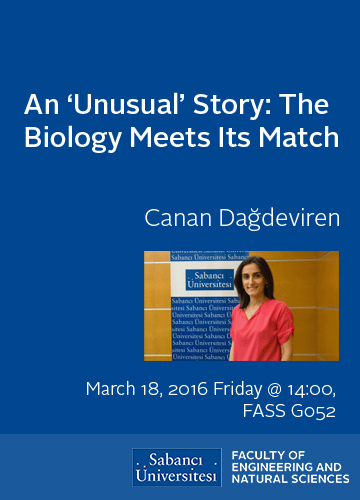An ‘Unusual’ Story: The Biology Meets Its Match
Canan Dağdeviren, MIT

Abstract: Multifunctional sensing capability, ‘unusual’ formats with flexible/stretchable designs, lightweight construction and self-powered operation are desired attributes for electronics that directly interface with the human body. Today’s electronics are stiffer by up to six orders of magnitude compared to soft tissue. Thus, present systems limit intimate integration with biology. I have focused on novel microfabrication techniques and tricks to use active piezoelectric materials and required electronic components, which have the shape and the mechanical properties that match with those of human tissues, in order to allow intimate integration without any irritation and/or harm on body.
In this talk, I describe novel materials, mechanics and device designs for emerging classes of wearable health monitoring systems and implantable, minimally invasive medical devices. These include a variety of electrodes, sensors, and energy harvesting components, with promising applications in bio-integrated electronics, such as self-powered cardiac pacemakers, wearable blood pressure sensors, modulus sensor patches, and brain injectrodes. The devices can be twisted, folded, stretched/flexed and wrapped onto curvilinear surfaces or implanted without damage or significant alteration in operation. The fabrication strategies and design concepts can be applied to various biological substrates and geometries of interest, and thus have the potential to broadly bridge the gap that exists between rigid, boxy electronics and soft, curvy biology.
Biography: Canan Dağdeviren was born in 1985 in Istanbul, Turkey. Canan obtained her B.Sc. in Physics Engineering from Hacettepe University in Ankara. She was awarded with full-scholarship throughout her M.Sc. studies in Materials Science and Engineering at Sabancı University in Istanbul. As being the top of the list in her field to be entitled to a Fulbright Doctoral Fellow, which was given for the first time in Turkey in 2009, she pursued her Ph.D. in Material Science and Engineering at the University of Illinois at Urbana-Champaign under supervision of Prof. John A. Rogers. Canan’s research experience focused on the applications of active piezoelectric materials and patterning techniques for ‘unusual’ electronic devices with an emphasis on bio-integrated systems. Her collective Ph.D. research has implications across a variety of sensors and energy harvesting components for self-powered cardiac pacemakers, multi-functional cardiac vessel stents, non-invasive/wearable/epidermal blood pressure sensors, and skin cancer detection bio-patches.
Canan received her Ph.D in December, 2014. Dagdeviren is currently a postdoctoral research associate in The David H. Koch Institute for Integrative Cancer Research of MIT, working with Prof. Robert Langer. She also collaborates with Prof. Michael Cima and Prof. Ann Graybiel at McGovern Institute for Brain Research of MIT.
Recently, Canan has been named a Junior Fellow of Harvard University, Society of Fellows; as being selected the first scientist from Turkey in the history. Currently, she has 18 journal papers, is inventor on 2 patent applications, and holds over 30 prestigious awards including; Materials Research Society Grad Student Awards (Fall & Spring Meetings, 2014), MIT Technology Review Award for Innovators under 35 (MIT TR35) in Turkey, Named as The Innovator of 2014 among the first generation MIT TR35 Turkey, Illinois Innovation Prize, Turkish American Scientists & Scholars Association (TASSA) Young Scholar Award, Racheff-Intel Award for Outstanding Materials Research, Forbes 30 Under 30 list in Science: Young Scientists Who Are Changing the World.
March 18, 2016 Friday at 14:00, FASS G052

